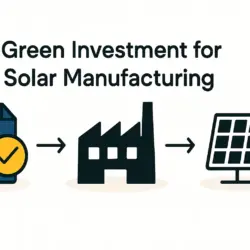New Zealand is proposing new tax changes to encourage the adoption of solar power and battery systems. The government has introduced a bill that will allow businesses to deduct the full cost of these technologies in the first year of purchase. This initiative is part of a larger effort to transition to a low-emissions economy by supporting renewable energy and reducing carbon emissions.
Proposed Tax Changes: Understanding the NZ solar tax credit
The proposed tax changes are part of the Taxation (Annual Rates for 2024-25, GST and Remedial Matters) Bill. The bill allows businesses to fully deduct the cost of solar panels, inverters, and battery systems from their taxable income in the first year of purchase. This measure aims to make solar power and battery systems more affordable, encouraging businesses to invest in renewable energy. For German businesses considering similar investments, this approach highlights the potential benefits of immediate tax deductions in reducing the initial financial burden.
Revenue Minister Barbara Edmonds stated that the intent is to help New Zealand meet its climate goals by making these technologies more accessible. She highlighted that businesses would benefit from reduced energy costs and lower carbon emissions, thus promoting a cleaner and more sustainable energy future. This mirrors the broader European emphasis on ESG (Environmental, Social, and Governance) factors, as discussed in Electric Avenue: September 26, where sustainable practices are increasingly vital for long-term business success.
Residential Battery Systems and Energy Storage with NZ solar tax credit
The bill also includes measures for residential battery systems and energy storage. Although residential battery systems do not generate electricity, they are essential for storing solar power for later use. The bill proposes that residential battery systems be treated the same as solar panels for tax purposes, allowing for full expensing of the cost in the first year. This is particularly relevant for homeowners in Germany, where energy storage solutions can significantly enhance the efficiency of residential solar installations.
The government’s focus on energy storage aligns with its commitment to a low-emissions economy. By encouraging the adoption of battery systems, the government aims to improve the efficiency and reliability of renewable energy sources, making it easier for businesses and households to transition to clean energy. This is in line with global trends, where countries like Australia are also seeing rapid growth in battery storage capacity.
Accelerated Depreciation for Solar Panels: The NZ solar tax credit
Under the current tax rules, solar panels are depreciated over a period of years, which can discourage businesses from investing in solar power. The new bill proposes accelerated depreciation for solar panels, allowing businesses to write off the entire cost in the first year. This change is expected to make solar power more attractive to businesses by reducing the upfront cost and providing immediate tax benefits. This approach mirrors discussions around investment boosts for farm solar power systems, making renewable energy more financially appealing.
Edmonds noted that the bill is designed to create a level playing field for all forms of energy generation. By extending these tax benefits to solar panels and battery systems, the government aims to encourage more businesses to adopt renewable energy.
Government’s Commitment to Renewable Energy: The NZ solar tax credit
The proposed tax changes reflect the government’s commitment to renewable energy and a low-emissions economy. Edmonds emphasized that these changes are part of a broader effort to support clean energy and reduce New Zealand’s carbon footprint. The bill is expected to make solar power and battery systems more affordable, thereby encouraging more businesses and households to invest in renewable energy. For German readers, this underscores the importance of government incentives in driving the adoption of sustainable technologies.
The bill also addresses the issue of energy storage, which is becoming increasingly important as more renewable energy systems are installed. By allowing full expensing of battery systems, the government aims to make it easier for businesses and households to store solar power for later use.
Overall, the proposed tax changes are intended to accelerate the adoption of solar power and battery systems in New Zealand. By making these technologies more affordable, the government hopes to support the transition to a low-emissions economy and help New Zealand meet its climate goals.



